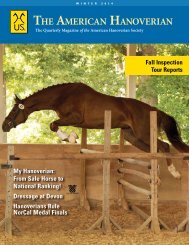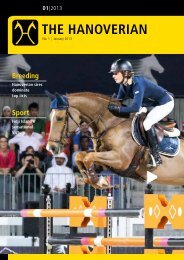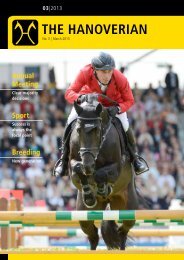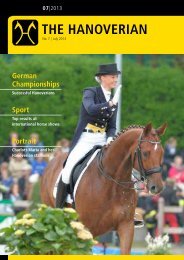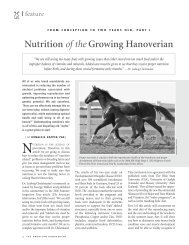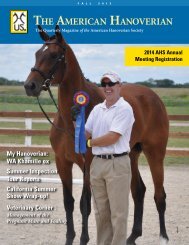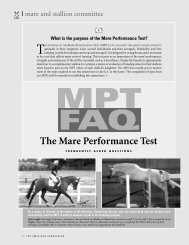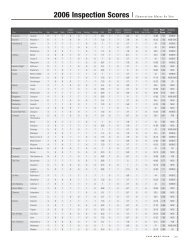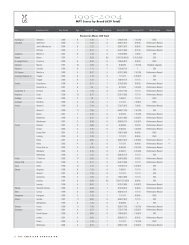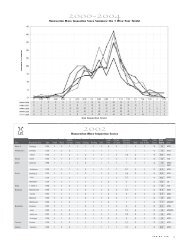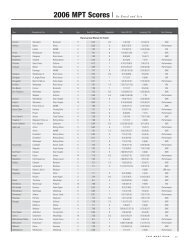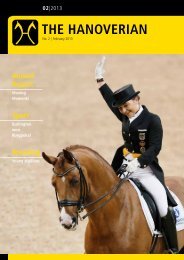The Hanoverian 08|2012 - the American Hanoverian Society!
The Hanoverian 08|2012 - the American Hanoverian Society!
The Hanoverian 08|2012 - the American Hanoverian Society!
Create successful ePaper yourself
Turn your PDF publications into a flip-book with our unique Google optimized e-Paper software.
<strong>The</strong> worries and concerns that <strong>the</strong> host of <strong>the</strong><br />
1964 Olympic Games in Tokyo would not measure<br />
up to <strong>the</strong> demands of <strong>the</strong> equestrian sport<br />
prove unfounded. Course designer Shunzo Kido<br />
builds a jumping course at <strong>the</strong> highest international<br />
level. <strong>The</strong> jumper riders from Germany, Hermann<br />
Schridde with Dozent by Deputant/Schuss II,<br />
Kurt Jarasinski with Torro and Hans Günter Winkler<br />
with Fidelitas by Doemnitz I, could be satisfied<br />
with almost 40 penalty points after <strong>the</strong> first round.<br />
<strong>The</strong>y add numerous penalty points during <strong>the</strong> second<br />
round. <strong>The</strong> German team finishes in first<br />
place winning <strong>the</strong> third team gold medal after <strong>the</strong><br />
war in <strong>the</strong> end. <strong>The</strong> French team earns silver and<br />
Italy bronze. Hermann Schridde is one of two riders<br />
to complete <strong>the</strong> second round of <strong>the</strong> Nation Prize<br />
without any faults. Schridde could have become<br />
<strong>the</strong> Olympic champion with a little bit of luck but<br />
his toughest competition, <strong>the</strong> Olympic champion<br />
from 1952, Pierre Jonqueres d’Oriola from France,<br />
risks everything in <strong>the</strong> second round and finishes in<br />
front of <strong>the</strong> German opponent with only nine penalty<br />
points. <strong>The</strong> dressage competitions take a<br />
ra<strong>the</strong>r satisfactory course. All three German competitors<br />
are able to secure a spot in <strong>the</strong> final. Harry<br />
Boldt and his grey mount Remus become <strong>the</strong> best<br />
German dressage competitor placing second behind<br />
<strong>the</strong> Suisse champion Henry Chammartin on<br />
Woermann. Josef Neckermann rides his Holstein<br />
mare Antoinette into fifth position, Reiner Klimke<br />
his Dux by Duellant/Staatsanwalt into sixth place.<br />
<strong>The</strong>se good individual results earn <strong>the</strong> German<br />
team <strong>the</strong> gold medal ahead of <strong>the</strong> Suisse team and<br />
<strong>the</strong> team from <strong>the</strong> United States. <strong>The</strong> German<br />
event riders deliver more than respectable performances<br />
in Tokyo. Before <strong>the</strong> Games <strong>the</strong> prognoses<br />
of winning a medal was less than slim. Winning<br />
<strong>the</strong> bronze medal in <strong>the</strong> team as well as in <strong>the</strong> individual<br />
competition comes to a great surprise. In<br />
accordance with <strong>the</strong> agreement between both<br />
German sporthorse associations Fritz Ligges and<br />
Horst Karsten compete representing <strong>the</strong> Federal<br />
Republic and Karl-Heinz Fuhrmann and Gerhard<br />
Schulz compete for <strong>the</strong> German Democratic Republic.<br />
Germany earns <strong>the</strong> bronze medal behind Italy<br />
and <strong>the</strong> United States. 26-year old Fritz Ligges and<br />
Donkosak by Dreikampf xx/Joho surprisingly bring<br />
home a well-deserved individual bronze medal. It<br />
is <strong>the</strong> last time that riders from East and West form<br />
a combined team.<br />
Mexico 1968: High altitude and downpour<br />
<strong>The</strong> expeditions to <strong>the</strong> Olympic Games in Tokyo<br />
1964 as well as numerous jumper competitions in<br />
<strong>the</strong> US and Canada showed that horses can handle<br />
long airplane trips quite well. <strong>The</strong>refore <strong>the</strong> journey<br />
to <strong>the</strong> next Games in Mexico in 1968 is no<br />
reason for concern but <strong>the</strong> unusual climatic condi-<br />
tions at an altitude of 2,000 meters for <strong>the</strong> competitions<br />
is. <strong>The</strong> team finishes in third place in dressage<br />
behind <strong>the</strong> Soviet Union and <strong>the</strong> German<br />
Democratic Republic whose team members rode<br />
very well. <strong>The</strong> German team finds itself in fifth position<br />
after <strong>the</strong> final jumping class. <strong>The</strong> British team<br />
takes home team gold, <strong>the</strong> United States win silver<br />
and Australia bronze. Horst Karsten is Germany’s<br />
best competitor on eleventh place in <strong>the</strong> individual<br />
competition. <strong>The</strong> Olympic Games have a very sad<br />
ending For Jochen Mehrdorf and his mount. Lapislazuli<br />
has a severe panic attack on <strong>the</strong> return flight<br />
and has to be shot. Germany’s dressage riders successfully<br />
defend <strong>the</strong>ir team gold medal in front of<br />
<strong>the</strong> USSR and Switzerland. Josef Neckermann and<br />
Mariano win <strong>the</strong> individual silver medal behind<br />
gold medal winner Ivan Kizimow. Dr. Reiner Klimke<br />
and Dux bring home <strong>the</strong> individual bronze medal.<br />
It is in <strong>the</strong> nature of <strong>the</strong> Mexican spectators to<br />
show <strong>the</strong> greatest enthusiasm for <strong>the</strong> jumping<br />
competitions. After all <strong>the</strong>ir riders have belonged<br />
to <strong>the</strong> best of <strong>the</strong> World for many years. Olympic<br />
champion William Steinkraus from <strong>the</strong> USA leads<br />
<strong>the</strong> field of 42 competitors on this day which happens<br />
to be his birthday followed by Marion Cakes<br />
from Great Britain. Four riders fight for <strong>the</strong> bronze<br />
medal including Günter Winkler with Enigk by<br />
Endsport xx. Winkler finishes in fifth position; <strong>the</strong><br />
bronze medal goes to David Broome. Team Canada<br />
is <strong>the</strong> surprising gold medal winning team followed<br />
by France. Germany wins bronze. Hermann<br />
Schridde’s rides are <strong>the</strong> sole reason why Germany<br />
looses <strong>the</strong> gold medal. He finishes both rounds<br />
with a total of 70,25 penalty points on his mount<br />
Dozent II. Alwin Schockmöhle and Donald Rex by<br />
Durban/Franz complete both courses with 18,75<br />
penalty points; <strong>the</strong> best result. Hans Günter Winkler<br />
and Enigk finish both courses with <strong>the</strong> sixth<br />
best result.<br />
Joy and mourning at <strong>the</strong> games in Munich in<br />
1972<br />
<strong>The</strong> games in Munich 1972 were to become <strong>the</strong><br />
most beautiful and joyous games of <strong>the</strong> post-war<br />
period. However a black shadow fell over this<br />
worldly event on <strong>the</strong> eleventh Olympic day. Eight<br />
Arabic terrorists break into <strong>the</strong> Olympic village during<br />
<strong>the</strong> early morning hours of September 5th,<br />
shoot two athletes and hold nine athletes hostage.<br />
<strong>The</strong> perpetrators from Palestine demand <strong>the</strong> release<br />
of 200 Arabic prisoners who are held in Israel<br />
and a plane for <strong>the</strong>ir escape. Snipers try to overcome<br />
<strong>the</strong> hijackers at <strong>the</strong> airport in Fürstenfeldbruck.<br />
<strong>The</strong>y kill three terrorists. All nine hostages, three<br />
additional hijackers and one German police officer<br />
are killed in <strong>the</strong> following gunfight. <strong>The</strong> competitions<br />
are stopped for 34 hours. At <strong>the</strong> time of <strong>the</strong><br />
terrorist attack <strong>the</strong> Olympic three-day event had<br />
Sport<br />
1964: Donkosak and Fritz Ligges (in<br />
this photo in Luhmühlen) are <strong>the</strong><br />
surprising but well deserved bronze<br />
medal winners in Tokyo..<br />
Text from “100 Years of Horse Breeding<br />
and Horse Sport in Germany.”<br />
Copy with kind authorization of <strong>the</strong><br />
FN-Publishing House, Warendorf.<br />
<strong>The</strong> <strong>Hanoverian</strong> <strong>08|2012</strong> 3



